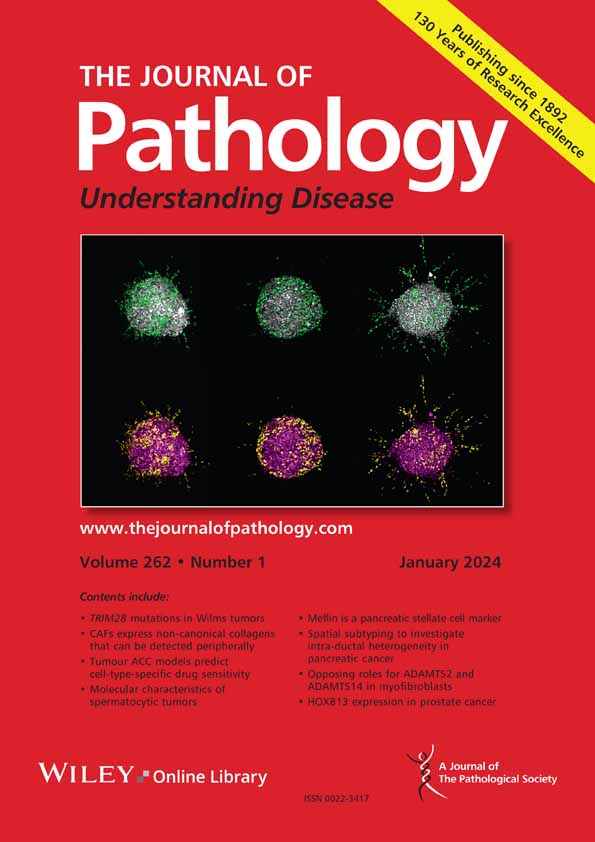Ziqing Zeng, Weijiao Du, Fan Yang, Zhenzhen Hui, Yunliang Wang, Peng Zhang, Xiying Zhang, Wenwen Yu, Xiubao Ren, Feng Wei
求助PDF
{"title":"The spatial landscape of T cells in the microenvironment of stage III lung adenocarcinoma","authors":"Ziqing Zeng, Weijiao Du, Fan Yang, Zhenzhen Hui, Yunliang Wang, Peng Zhang, Xiying Zhang, Wenwen Yu, Xiubao Ren, Feng Wei","doi":"10.1002/path.6254","DOIUrl":null,"url":null,"abstract":"<p>This study aimed to provide more information for prognostic stratification for patients through an analysis of the T-cell spatial landscape. It involved analyzing stained tissue sections of 80 patients with stage III lung adenocarcinoma (LUAD) using multiplex immunofluorescence and exploring the spatial landscape of T cells and their relationship with prognosis in the center of the tumor (CT) and invasive margin (IM). In this study, multivariate regression suggested that the relative clustering of CT CD4<sup>+</sup> conventional T cell (Tconv) to inducible Treg (iTreg), natural regulatory T cell (nTreg) to Tconv, terminal CD8<sup>+</sup> T cell (tCD8) to helper T cell (Th), and IM Treg to tCD8 and the relative dispersion of CT nTreg to iTreg, IM nTreg to nTreg were independent risk factors for DFS. Finally, we constructed a spatial immunological score named the G<sub>T</sub> score, which had stronger prognostic correlation than IMMUNOSCORE® based on CD3/CD8 cell densities. The spatial layout of T cells in the tumor microenvironment and the proposed G<sub>T</sub> score can reflect the prognosis of patients with stage III LUAD more effectively than T-cell density. The exploration of the T-cell spatial landscape may suggest potential cell–cell interactions and therapeutic targets and better guide clinical decision-making. © 2024 The Pathological Society of Great Britain and Ireland.</p>","PeriodicalId":232,"journal":{"name":"The Journal of Pathology","volume":"262 4","pages":"517-528"},"PeriodicalIF":5.6000,"publicationDate":"2024-02-16","publicationTypes":"Journal Article","fieldsOfStudy":null,"isOpenAccess":false,"openAccessPdf":"","citationCount":"0","resultStr":null,"platform":"Semanticscholar","paperid":null,"PeriodicalName":"The Journal of Pathology","FirstCategoryId":"3","ListUrlMain":"https://onlinelibrary.wiley.com/doi/10.1002/path.6254","RegionNum":2,"RegionCategory":"医学","ArticlePicture":[],"TitleCN":null,"AbstractTextCN":null,"PMCID":null,"EPubDate":"","PubModel":"","JCR":"Q1","JCRName":"ONCOLOGY","Score":null,"Total":0}
引用次数: 0
引用
批量引用
Abstract
This study aimed to provide more information for prognostic stratification for patients through an analysis of the T-cell spatial landscape. It involved analyzing stained tissue sections of 80 patients with stage III lung adenocarcinoma (LUAD) using multiplex immunofluorescence and exploring the spatial landscape of T cells and their relationship with prognosis in the center of the tumor (CT) and invasive margin (IM). In this study, multivariate regression suggested that the relative clustering of CT CD4+ conventional T cell (Tconv) to inducible Treg (iTreg), natural regulatory T cell (nTreg) to Tconv, terminal CD8+ T cell (tCD8) to helper T cell (Th), and IM Treg to tCD8 and the relative dispersion of CT nTreg to iTreg, IM nTreg to nTreg were independent risk factors for DFS. Finally, we constructed a spatial immunological score named the GT score, which had stronger prognostic correlation than IMMUNOSCORE® based on CD3/CD8 cell densities. The spatial layout of T cells in the tumor microenvironment and the proposed GT score can reflect the prognosis of patients with stage III LUAD more effectively than T-cell density. The exploration of the T-cell spatial landscape may suggest potential cell–cell interactions and therapeutic targets and better guide clinical decision-making. © 2024 The Pathological Society of Great Britain and Ireland.
III 期肺癌微环境中 T 细胞的空间分布。
这项研究旨在通过分析T细胞的空间分布,为患者的预后分层提供更多信息。研究采用多重免疫荧光技术分析了80例III期肺腺癌(LUAD)患者的染色组织切片,探讨了肿瘤中心(CT)和浸润边缘(IM)的T细胞空间分布及其与预后的关系。在这项研究中,多变量回归表明,CT CD4+ 传统 T 细胞(Tconv)与诱导性 Treg(iTreg)、自然调节性 T 细胞(nTreg)与 Tconv、末端 CD8+ T 细胞(tCD8)与辅助性 T 细胞(Th)、IM Treg 与 tCD8 的相对聚集,以及 CT nTreg 与 iTreg、IM nTreg 与 nTreg 的相对分散是 DFS 的独立危险因素。最后,我们构建了一个名为GT评分的空间免疫学评分,它比基于CD3/CD8细胞密度的IMMUNOSCORE®具有更强的预后相关性。与T细胞密度相比,T细胞在肿瘤微环境中的空间布局和提出的GT评分能更有效地反映III期LUAD患者的预后。对T细胞空间格局的探索可能会提示潜在的细胞-细胞相互作用和治疗靶点,从而更好地指导临床决策。© 2024 大不列颠及爱尔兰病理学会。
本文章由计算机程序翻译,如有差异,请以英文原文为准。

 求助内容:
求助内容: 应助结果提醒方式:
应助结果提醒方式:


